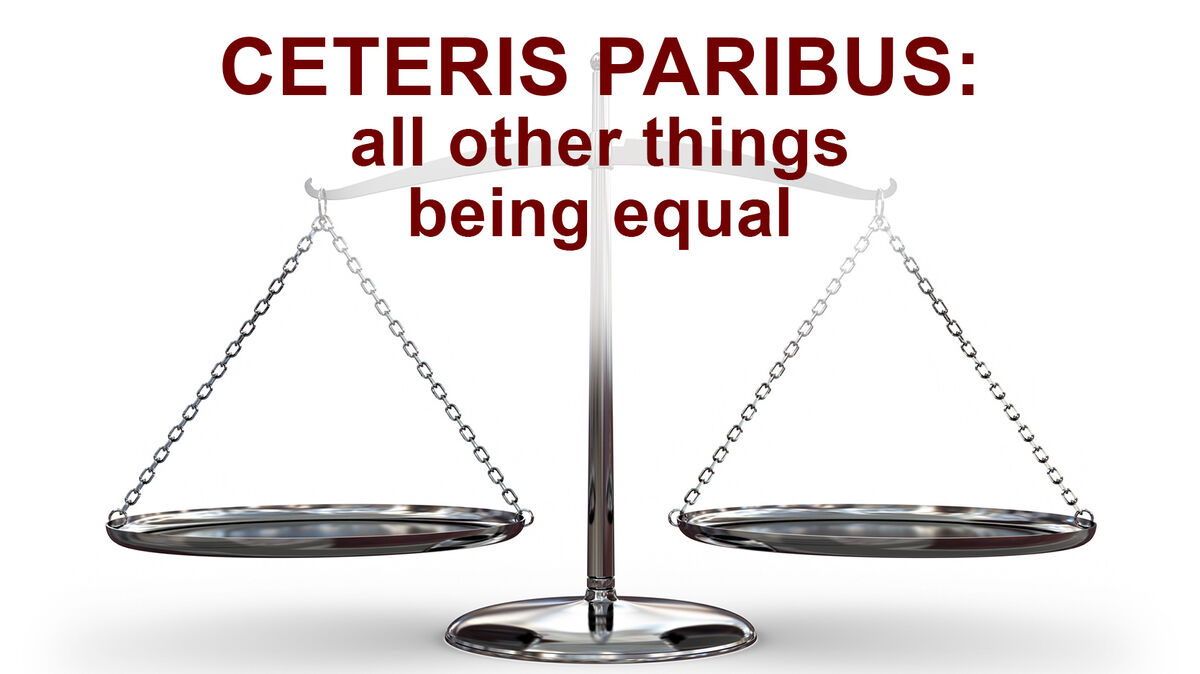
The Latin phrase ceteris paribus means "other things being equal." It’s typically used to describe an economic situation of cause and effect while assuming that all other factors stay the same. Keep reading for ceteris paribus examples in economics and how it applies to psychology and psychology as well.
Ceteris Paribus in Economics
Unlike math, economics is not an exact science because it relies on human behavior. However, ceteris paribus allows economists to make assumptions that variables like human buying patterns, inflation rates and unemployment will remain fixed over a period of time. They can then build economic models that allow them to apply a change to each factor one by one.
Examples of ceteris paribus in economics include:
- If the price of milk increases, ceteris paribus, people will purchase less milk. Ceteris paribus doesn’t consider the price of competing products, the availability of milk or other factors that would affect customers’ decreasing desire to buy less milk. It only considers the cause (increased price) with one effect (decreased sales of milk).
- If the United States drilled for oil off of its own shores, ceteris paribus, the price of gasoline would drop. This does not factor in any other variables, including possible taxes on the price of gas for consumers or environmental laws that would prevent domestic drilling.
- If mortgage interest rates decrease, ceteris paribus, more people will buy houses. The ceteris paribus assumption does not consider changes in the real estate climate or availability of homes for sale. Economists can then factor in these variables one at a time.
- If the minimum wage increases, ceteris paribus, unemployment rates will rise. The assumption here is that employers who pay their workers higher wages can’t afford to hire more employees or even keep all of their current employees. It doesn’t consider factors outside the supply and demand model (high supply of wages leads to a lower demand of employees).
- If the government prints more money, ceteris paribus, interest rates will go up. The ceteris paribus assumption is that a higher supply of money will lead to inflation, which increases interest rates. It doesn’t consider exogenous variables such as the effects of inflation on buying behavior and economic growth.
Ceteris Paribus in Psychology
Ceteris paribus applies to other social sciences as well. Psychology, for example, includes many models that use ceteris paribus assumptions. Some examples include:
- If a person has a goal, ceteris paribus, they will pursue the actions needed to fulfill that goal. The ceteris paribus assumption ignores the variables of personal motivation or external factors that may prevent one from reaching a goal.
- A child who grows up in a psychologically healthy home will, ceteris paribus, become a psychologically healthy adult. This model doesn’t factor in other variables, such as mental illness or influences outside the home.
- A psychological subject will, ceteris paribus, answer questions in a way that makes them look good to an interviewer. The ceteris paribus assumption keeps psychological researchers aware of their subjects’ answering tendencies, but excludes other variables on a person’s desire to come off well.
Ceteris Paribus in Physics
The laws of physics also fall into ceteris paribus assumptions. Physics applies a variable to a set situation and observes how it changes, assuming that all other variables are fixed. You can apply ceteris paribus to physics in several ways, including:
- Ceteris paribus, planets orbit in an elliptical pattern. This does not take into account other factors that could cause a planet to orbit in a non-elliptical pattern.
- If you press on a spring, ceteris paribus, it will bounce back. Variables that this ceteris paribus assumption exclude are the material of the spring and the force applied to it.
- If you drop an object, ceteris paribus, it will fall to the ground. This ceteris paribus uses the law of gravity to predict what will happen. Additional variables to consider might be the weight of the object and whether anything is blocking its path to the ground.
Ceteris Paribus vs. Mutatis Mutandis
Ceteris paribus is often confused with another assumption model called mutatis mutandis, which means “having made the necessary changes.” While ceteris paribus assumes that all other factors remain constant, mutatis mutandis assumes that other factors have changed in order for the statement to be true. It’s mostly used in economics and law, but also applies to mathematics.
Latin Phrases in our Society
Ceteris paribus holds all other factors as fixed and unchanging in the face of another variable. It’s one of many Latin phrases that still succinctly describe economic, legal and social situations in our world. Take a look at more Latin phrases that influence our legal system and still exist today.